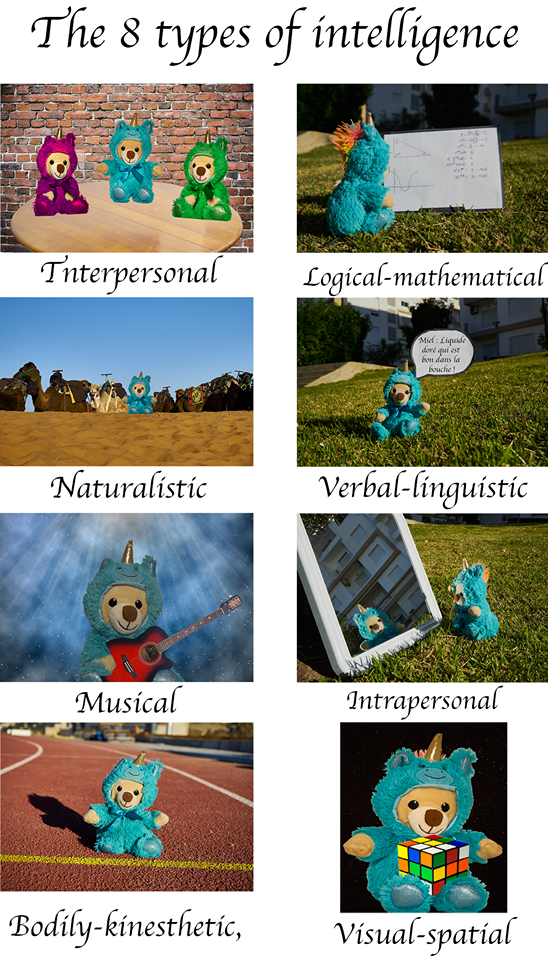Over the past few weeks, we’ve introduced Howard Gardner’s theory of multiple intelligences to you, and we’ve focused on each of the 8 intelligences he recognizes beyond doubt and on different ideas in order to develop them. Today, for the conclusion of this dossier, we will discuss a possible 9th type of intelligence and we will suggest an idea to use in class or at home in order to enhance the type of intelligence of children and thus increase their self-esteem.

Existential intelligence, true or false?
Also called spiritual intelligence, this 9th type of intelligence has been one of the main subjects of the psychologist’s work for several years. Although he defines it very clearly and recognizes that people have much more interest in thinking about and thinking about the big questions in life than others, Gardner talks more about this type of intelligence. like the 8 ½ of his theory. What prevents him from recognizing it in its own right? It is that for each of the 8 other intelligences, he was able to identify without a shadow of a doubt the areas of the brain where these intelligences are located and therefore to see concretely that they were more or less developed according to the individual. For existential intelligence, he found no evidence that philosophical questions are directly related to a part of the brain. So according to his very scientific reasoning, it is impossible to grant him the same status as the others.
But what is meant by existential or spiritual intelligence? It is the ability to ask questions about the meaning and origin of things, to philosophize, to think about the big questions of the universe and to locate oneself in relation to cosmic limits. People with this type of intelligence would be more interested than others in studying, defining, questioning, analyzing and creating the rules and behaviors for life. They will also often have a marked interest in the infinitely small and the infinitely large, will need to find meaning in their life, a mission, and will feel connected to the world and to the universe that they will see as a whole. These are the very spiritual and / or very religious people who pushed Gardner to be interested in the question since he could not make a link between this very marked interest, which becomes the center of the life of these people, and the types of intelligence he had already recognized.
Since then, many other specialists have looked into multiple intelligences and although Gardner’s work is still THE benchmark in this field, other specialists have put forward different ideas. Would there be, for example, financial intelligence, or one or more types of emotional intelligence? Could it be that there is an educational intelligence or a creative intelligence? Numerous studies are underway on this subject all over the planet. But in any case, there is no longer any doubt for the vast majority of specialists: the types of intelligence are numerous and each human being is intelligent in his own way. If he is given the chance to develop his intelligence while valuing it, he will be capable of great things.
Furthermore, for Gardner, this theory opens the door to a whole new way of looking at things. Since they are not global, different types of intelligence can more easily be developed according to people’s interests, wants and needs. No athlete reaches their full potential without training. The same goes for each of the intelligences.
Simple ideas for valuing different types of intelligence in the classroom or at home
- Introduce children to the different types of intelligence and invite them to identify which ones are most present in their self by reflecting on what they are naturally good at and what interests them most.
- Print and display the eight types of intelligence in the classroom or at home, in full view of children. You can even invite children to paste their photo on the intelligence (s) they most associate with.
- Discuss together ideas to develop the intelligences that interest them the most and allow them to apply them.
- When a child becomes discouraged or compares to others when facing a difficulty, bring him before the table of different types of intelligence and remind him that he has other strengths and value them. No single type of intelligence is more important than the others in Gardner’s theory.
To return to the different types of intelligence (and find lots of ideas for activities to develop them that are timely in this period of confinement):
Visual-spatial intellience: http://a-autrement.ca/en/2020/02/06/visual-spatial-intelligence/
Interpersonal intelligence: http://a-autrement.ca/en/2020/02/27/interpersonal-intelligence/
Intrapersonal intelligence: http://a-autrement.ca/en/2020/03/12/intrapersonal-intelligence-the-eighth-intelligence-but-not-the-least/
Musical intelligence: http://a-autrement.ca/en/2020/02/13/musical-intelligence/
Naturalistic intelligence: http://a-autrement.ca/en/2020/02/20/naturalistic-intelligence/
Kinesthetic intelligence: http://a-autrement.ca/en/2020/01/29/kinesthetic-intelligence/
Logical-Mathematical intelligence: http://a-autrement.ca/en/2020/01/16/logical-mathematical-intelligence/
Linguistic intelligence: http://a-autrement.ca/en/2020/01/16/linguistic-intelligence-what-it-is-and-how-to-develop-it/